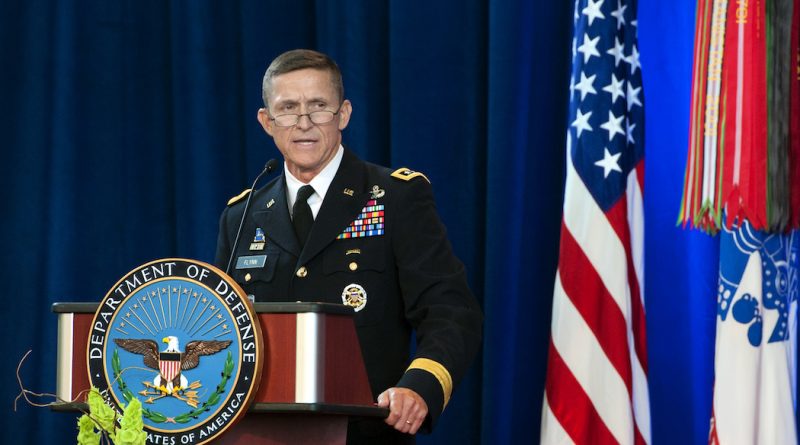General Flynn resigns from Trump Administration
By: Sean Newhouse – Staff Writer
On Feb. 13, 2017 the White House announced in a press release that President Trump accepted the resignation of National Security Advisor, Lt. Gen. Michael Flynn (Ret.). Flynn stated in his resignation letter that “…I inadvertently briefed the Vice President Elect and others with incomplete information regarding my phone calls with the Russian ambassador.”
Specifically, the resignation came after it was released that Flynn had discussed President Obama’s new sanctions on Russia with the Russian ambassador to the U.S., after he had claimed that he hadn’t.
The call with the ambassador took place in late December, before Trump took office. The sanctions discussed were placed on Russia by the United States under the Obama administration after it was confirmed that Russia interfered in the U.S. presidential election.
To understand the implications of this resignation that occurred not even one month into the Trump administration, one must examine past information. To start, who is Michael Flynn?
Lieutenant General Michael T. Flynn served for over 30 years in the Army. His major appointments include being the Chief Military Officer for Joint Special Operations Command (JSOC) in the Iraq and Afghanistan campaigns and being the Director of the Defense Intelligence Agency (DIA), an intelligence service for the Pentagon, under President Obama.
Two years after his retirement, in his speech at the Republican National Convention in July 2016, he said about Hillary Clinton, “Lock her up! Yes, that’s right, lock her up!” In an Oct. 2016 POLITICO article, James Kitfield chronicles Flynn’s transformation from military service to the political sphere.
In his role as Director of the DIA, Flynn was described as a “maverick.” He met bureaucratic resistance frequently and became angered with the Obama administration after they dismissed his close friend and former boss, Gen. Stanley McChrystal, following the publishing of a Rolling Stone article that anonymously quoted members of McChrystal’s staff criticizing the Obama administration.
His relationship with the Obama White House became more strained as their policy objectives began to diverge. While Obama’s leadership team believed the death of Osama bin Laden signaled somewhat of an end to the fear of foreign terrorism and the wars in Iraq and Afghanistan, Flynn adamantly argued that the U.S. needed to remain firmly committed to fight global terrorism.
Flynn frequently noted in strategic meetings that the number of radical Islamic terrorist groups doubled between 2004 and 2013 and their global footprint increased.
This disagreement over policy decisions led to his premature retirement at age 56.
Following his retirement, Gen. Flynn appeared multiple times on Fox News programs and served as a de facto national security advisor to multiple Republican presidential candidates. His relationship with Trump solidified after it became clear that Trump would be the Republican nominee for President.
When he was picked for the position of National Security Advisor, it was a controversial choice. Flynn has been described as “the best intelligence officer of his generation” by four-star Gen. Barry McCaffrey and as a “right-wing nutty” by four-star Gen. Colin Powell in a leaked personal e-mail.
Furthermore, Flynn attended a banquet in Moscow with the Russian President Vladimir Putin in 2015.
Gen. Flynn received more scrutiny after The Washington Post broke the story on Jan. 12th of the discrepancy in the phone call to the Russian ambassador.
On Jan. 15, Pence said on CBS’ Face the Nation that “(Flynn) did not discuss anything having to do with the United States’ decision to expel diplomats or impose censure against Russia.”
Before she was fired on Jan. 30 by Trump for refusing to enforce his executive order regarding the travel ban, acting Attorney General Sally Yates informed the White House on Jan. 26 of a discrepancy between what Flynn discussed with the Russian ambassador and what he told officials.
On Feb. 8, Flynn told The Washington Post that he did not discuss sanctions with the Russian ambassador. The next day he revised his comment and said “(he) couldn’t be certain that the topic never came up.”
On Feb. 13, Trump’s counselor Kellyanne Conway said in the afternoon that the President had “full confidence” in Flynn. That same day, Press Secretary Sean Spicer told reporters, “The president is evaluating the situation….” By that evening, Flynn had resigned.
Spicer said the following day that Flynn was asked to resign because he had lost the trust of the president and vice president.
Naturally, there are numerous unanswered questions. Senate Majority Leader Mitch McConnell stated on Feb. 14 that it was “extremely likely” that the Senate intelligence committee will investigate Flynn.
While the phone call itself is not scandalous, the fact that Flynn mischaracterized the nature of his conversation with the ambassador (whether by accident or not) in a time of tense relations with Russia is damaging. Moreover, the conflicting information given by various White House officials doesn’t help the Trump administration with its image problem for having a lack of organization.
On Feb. 20, Trump announced that Lt. Gen. H. R. McMaster, a veteran of the Persian Gulf and Iraq war, was his pick to replace Lt. Gen. Flynn as his National Security Advisor.
Photo Courtesy of Wikipedia.org.

